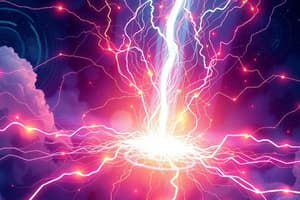Podcast
Questions and Answers
What is a conductor?
What is a conductor?
- A material that does not conduct electricity
- An instrument that measures voltage
- A device that conducts heat, electricity, or sound (correct)
- A unit of electrical resistance
What is an insulator?
What is an insulator?
A substance or device that does not readily conduct electricity.
What is the purpose of a resistor?
What is the purpose of a resistor?
A device having a designed resistance to the passage of an electric current.
What does voltage represent?
What does voltage represent?
What is current in terms of electricity?
What is current in terms of electricity?
How is resistance defined?
How is resistance defined?
What is electrical power?
What is electrical power?
Define conventional current.
Define conventional current.
What is electron flow?
What is electron flow?
What is a parallel circuit?
What is a parallel circuit?
What is a series circuit?
What is a series circuit?
Define a closed circuit.
Define a closed circuit.
What is an open circuit?
What is an open circuit?
What is AC?
What is AC?
What is meant by load in electrical terms?
What is meant by load in electrical terms?
What is a fuse?
What is a fuse?
What is a circuit breaker?
What is a circuit breaker?
Define volts.
Define volts.
What is an ampere?
What is an ampere?
What are ohms?
What are ohms?
What are watts?
What are watts?
What is a voltmeter?
What is a voltmeter?
What is an ammeter?
What is an ammeter?
Flashcards
Conductor
Conductor
A material that easily transmits electricity.
Insulator
Insulator
A material that resists electricity flow.
Resistor
Resistor
A component that opposes electric current.
Voltage
Voltage
Signup and view all the flashcards
Current
Current
Signup and view all the flashcards
Resistance
Resistance
Signup and view all the flashcards
Electrical Power
Electrical Power
Signup and view all the flashcards
Conventional Current
Conventional Current
Signup and view all the flashcards
Electron Flow
Electron Flow
Signup and view all the flashcards
Parallel Circuit
Parallel Circuit
Signup and view all the flashcards
Series Circuit
Series Circuit
Signup and view all the flashcards
Closed Circuit
Closed Circuit
Signup and view all the flashcards
Open Circuit
Open Circuit
Signup and view all the flashcards
Alternating Current (AC)
Alternating Current (AC)
Signup and view all the flashcards
Direct Current (DC)
Direct Current (DC)
Signup and view all the flashcards
Load
Load
Signup and view all the flashcards
Fuse
Fuse
Signup and view all the flashcards
Circuit Breaker
Circuit Breaker
Signup and view all the flashcards
Volts (V)
Volts (V)
Signup and view all the flashcards
Amperes (A)
Amperes (A)
Signup and view all the flashcards
Ohms (Ω)
Ohms (Ω)
Signup and view all the flashcards
Watts (W)
Watts (W)
Signup and view all the flashcards
Study Notes
Electrical Terminology
- Conductor: Material that effectively transmits heat, electricity, or sound; key for efficient electrical systems.
- Insulator: Substance that restricts electrical conductivity; vital for preventing unwanted current flow.
- Resistor: Device designed to provide a specific resistance to electric current; crucial in controlling current flow.
- Voltage: Measured in volts; represents electromotive force or potential difference in a circuit.
- Current: Flow of electricity measured in amperes; results from the movement of charged particles in a circuit.
- Resistance: Measured in ohms; defined by Ohm's Law (V = IR), and opposes electric current flow.
- Electrical Power: Rate at which electrical energy is transferred, expressed in watts (1 watt = 1 joule/second).
Current Types
- Conventional Current: Defined as the flow of electric charge that moves in the direction of positive charge flow; important for circuit analysis.
- Electron Flow: How electrons move through conductors; involves atoms exchanging electrons, creating a continuous flow.
Circuit Configurations
- Parallel Circuit: Configuration where current splits into multiple paths; each path receives full voltage and total current is the sum of the branch currents.
- Series Circuit: Current flows through a single path; voltage is divided among loads while current remains consistent throughout.
- Closed Circuit: Complete electrical connection allowing current flow; essential for functional devices.
- Open Circuit: Incomplete electrical connection; prevents current flow, rendering the circuit inactive.
Current Types
- Alternating Current (AC): Electricity that reverses direction periodically; commonly used in household power supply.
- Direct Current (DC): Flows in one direction only; typically found in batteries and electronic devices.
Electrical Safety
- Load: Represents the amount of power consumed by devices; indicates the electric demands placed on a power source.
- Fuse: Safety device designed to break the circuit when current exceeds safe levels; prevents overheating and fires.
- Circuit Breaker: Automatic device that interrupts current flow as a safety measure; can be reset after tripping.
Measurement Units
- Volts (V): Unit of measure for electric potential; drives current through resistance.
- Amperes (A): Unit of electric current; fundamental unit of measurement for electric flow.
- Ohms (Ω): Unit measuring electrical resistance; crucial for determining how much current will flow under voltage.
- Watts (W): Unit of power reflecting energy conversion in circuits; essential for calculating energy costs.
- Voltmeter: Instrument measuring electric potential in volts; used for diagnostics in electrical systems.
- Ammeter: Instrument measuring electric current in amperes; valuable for analyzing circuit performance.
Studying That Suits You
Use AI to generate personalized quizzes and flashcards to suit your learning preferences.




